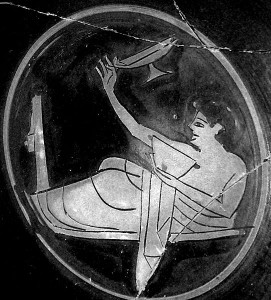I started with the Catullus poem 50, a wonderful poem about a little incident of friendship and spontaneous epigram writing that captures much of the genre. The next three poems by Martial explore these themes of naughtiness, temporariness, and lightness.
Benjamin Walter
Catullus 50
Hesterno, Licini, die otiosi
multum lusimus in meis tabellis,
ut convenerat esse delicatos.
scribens versiculos uterque nostrum
ludebat numero modo hoc modo illoc,
reddens mutua per iocum atque vinum.
atque illinc abii tuo lepore
incensus, Licini, facetiisque,
ut nec me miserum cibus iuvaret,
nec somnus tegeret quiete ocellos,
sed toto indomitus furore lecto
versarer cupiens videre lucem,
ut tecum loquerer simulque ut essem.
at defessa labore membra postquam
semimortua lectulo iacebant,
hoc, iucunde, tibi poema feci,
ex quo perspiceres meum dolorem.
nunc audax cave sis, precesque nostras,
oramus, cave despuas, ocelle,
ne poenas Nemesis reposcat a te.
est vehemens dea: laedere hanc caveto.
We idled yesterday, Licinus, a lot,
On my little notebook—we’d made a pact to be naughty–
Scribbling couplets about this and that,
And playing off each others’, in jest and wine.
I left your place inflamed by your charm,
Licinus, and witticisms–
Not even food would please wretched me!
Calm sleep wouldn’t touch my poor eyes either.
Untamed, I tossed and turned over the whole bed,
Wanting to see the light,
So I could talk to you and of course be with you.
But at last I threw my worn out limbs on the bed,
Half dead with labor,
And I made this poem for you, charming friend,
So that you can feel my pain.
So don’t be reckless, and don’t,
I beg, despise our prayers, my jewel,
Lest Nemesis demand her punishments from you;
For she is a vehement goddess; beware to injure her.
Martial 1.107
Saepe mihi dicis, Luci carissime Iuli,
‘Scribe aliquid magnum: desidiosus homo es.’
Otia da nobis, sed qualia fecerat olim
Maecenas Flacco Vergilioque suo:
Condere victuras temptem per saecula curas
Et nomen flammis eripuisse meum.
In steriles nolunt campos iuga ferre iuvenci:
Pingue solum lassat, sed iuvat ipse labor.
You often say to me, “Dearest Lucius Julius,
Write something great: you are a lazy man.”
Well then, give me leisure—but the sort Maecenas once
gave to Flaccus, or his own Vergil.
Then I’d try to write works to outlive the ages
And snatch my name from the flames.
Yoked oxen don’t like to plow sterile fields:
The fertile soil is tiring, but the labor’s a pleasure.
Martial 2.87
Dicis amore tui bellas ardere puellas,
Qui faciem sub aqua, Sexte, natantis habes
You say pretty girls are hot for you, Sextus,
You who have the face of a man underwater.
Martial 4.49
Nescit, crede mihi, quid sint epigrammata, Flacce,
Qui tantum lusus ista iocosque vocat.
Ille magis ludit, qui scribit prandia saevi
Tereos, aut cenam, crude Thyesta, tuam,
Aut puero liquidas aptantem Daedalon alas,
Pascentem Siculas aut Polyphemon ovis.
A nostris procul est omnis vesica libellis,
Musa nec insano syrmate nostra tumet.
‘Illa tamen laudant omnes, mirantur, adorant.’
Confiteor: laudant illa, sed ista legunt.
Believe me, Flaccus, whoever doesn’t know what epigrams are
Calls them a load of tricks and jokes.
But I argue that he plays a lot who writes
About the lunches of cruel Tereus,
Or your dinner, bloody Thyestes,
Or Daedalus fitting clear wings to his boy,
Or Polyphemus feeding Sicilian sheep.
All puffed-up vanity is absent from my little books;
Our muse doesn’t swell with a mad robe.
“Still, everybody praises those poems, they marvel, they adore.”
Chosen and translated by Benjamin Walter.
Text from the Perseus Collection. Read more.
Read more about Martial on Lesbia.


The last line of the translation of Martial 4.49 is missing I think.